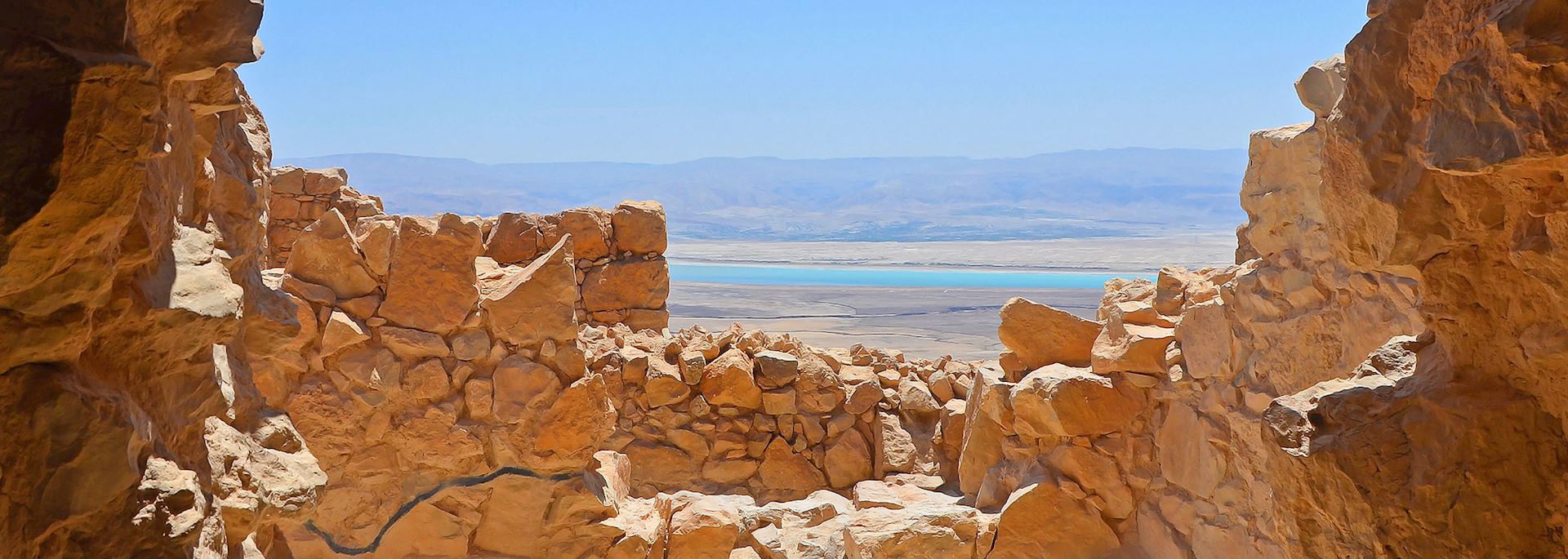Practical Information
Although Israel is one of the smallest countries in the Middle East, it is not short of history, breathtaking landscapes or diverse peoples. In just a few days you can experience the ancient city of Jerusalem, the metropolitan buzz of Tel Aviv, and the wealth of historic, religious and cultural sites scattered across the country.
Planning your trip
Israel is known for being an important religious destination, but there is plenty more to explore beyond the religious sites. When we design your itinerary, we’ll look at how we can tailor your trip to Israel to best suit you, whether you’re interested in religious experiences, outdoor adventure, food and culture, or other types of activity.
Combining Israel and Jordan
Many visitors to the area will choose to visit both Jordan and Israel, usually crossing the border at either the Allenby Bridge or Sheikh Hussein Bridge.
Language
Israel’s national language is Hebrew, though thanks to the large immigrant population you’re likely to hear a host of other languages spoken, including Arabic and Russian. Many people will speak at least some English though and all your guides will speak English very well.
Food & drink
Israeli cuisine reflects the diversity of its people, drawing influence from European and Middle Eastern Jews, Arabs, Armenians and more. Restaurants in Israel are particularly good; the high cost of renting premises forces many restaurants to compete at a very high level in order to stay in business. As a result, you’ll find excellent meals almost everywhere, especially in Tel Aviv. Street food is also very popular, with shawarma (thinly sliced meat in a bread pocket), falafel and bourekas (pastries commonly filled with cheese, potato, spinach or mushrooms) widely on offer.
As in much of the Middle East, coffee and tea are also incredibly popular in Israel. However, depending on whether you’re in a predominantly Jewish or Arab area, you may find some slight differences in the way they’re served. In Jewish areas you’ll find tea and coffee in European or American cafés, while in Arab areas you’ll find them in coffee houses which often serve nothing else.
Festivals & public holidays
With large Jewish and Christian populations, there are several festivals and holidays throughout the year, both joyful and solemn. Early in the year you can experience the joyous festival of Purim, when people fill the streets with carnival-style parades and music, while more solemn holidays like Yom Kippur will bring quiet streets, closed shops and fasting throughout the country. Additionally, on Shabbat — beginning at sundown on Friday and ending at sundown on Saturday — many Jews will refrain from doing any kind of work, even things as simple as using the phone or turning on a light. Many restaurants in Jerusalem close for Shabbat, though hotel restaurants generally stay open.
Public holidays
Most of Israel’s public holidays follow the Jewish lunar calendar, so their actual dates will vary from year to year. Below is a list of public holidays with the times of year at which they generally fall:
- March — Purim
- April — Passover
- April/May — Yom Haatzmaut (Independence Day)
- May/June — Pentecost
- July/August — Tisha B’Av
- September/October — Rosh Hashanah
- September/October — Yom Kippur
- September/October — Sukkot
- September/October — Simchat Torah
Tipping
Tipping in Israel is not quite as intrinsic to the culture as in other areas in the region, though it’s always an accepted gesture. Some restaurants and cafés have introduced mandatory service charges, though in most cases you can tip what you like — we would recommend 10-15% for good service.
Money & expenses
Israel’s currency is the New Israeli Shekel. There are 100 agorot (agora singular) in a shekel. Major credit cards are widely accepted, and ATMs are relatively common though not all have the option to switch from Hebrew to English.
Communications
The country code for Israel is +972. Making international calls from hotels can be expensive, but most hotels, restaurants and cafés will offer free Wi-Fi. It’s also a good idea to check with your mobile phone provider to find out about international roaming plans and costs.
Social
Most parts of Israel exhibit a fairly western attitude, with some exceptions in Orthodox or Palestinian areas. It’s also expected that visitors will be properly dressed in certain public areas and at religious sites, with shoulders and legs covered. At some Jewish sites, men may be asked to wear a kippah (a small brimless cap), though a paper one will usually be provided.
Do not photograph anything related to the military or to government buildings, especially bridges, canals or anything that could be deemed as having strategic significance. It’s also always good to ask people’s permission before photographing them.
Smoking in public is generally banned in Israel, though some restaurants may have a separate smoking area.
Travel Advice
Our certified country specialists can advise on any safety concerns you may have. For current information, please refer to the Canadian Government Travel & Tourism website.
When to go to Israel
You'll find temperature and rainfall information, together with a month-by-month guide on visiting, on our guide for when to go to Israel.
More Information
-
Flight Time
10 hours 30 upwards dependent on airline (Toronto to Tel Aviv) -
Time Zone
UTC +3

